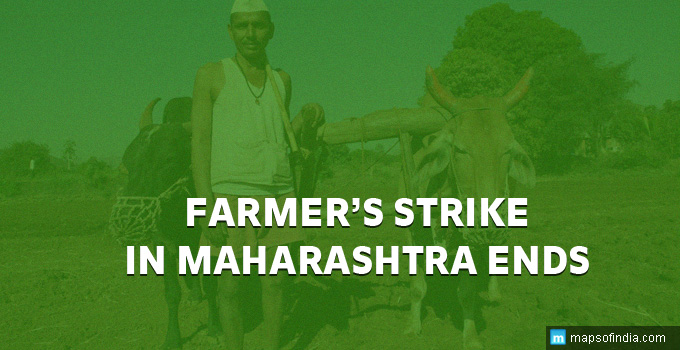Following failed talks between the farmers and the state government on 30 May 2017, where they had demanded waiver of all farm loans and remunerative prices for farm produce among others, farmers in Maharashtra went on an indefinite strike on 1 June 2017.
Farmers went on a rampage with their own produce dumping milk and vegetables on the highways to be destroyed by vehicles during the state-wide strike. The farmers also staged road blockades and courted arrests at many places in Maharashtra. They also threatened not to take up any farming activity, including the sowing for the kharif season in case their demands were not met.
There were also reports of stray incidents of violence following which CrPC Section 144 was promulgated in Nashik.
According to Shankar Pingale, ex-director at the vegetable market at Vashi, only 150 trucks containing vegetables had reached Maharashtra in place of the normal load of 450-500 trucks. Of these 150 trucks, only 10 were from Maharashtra while the remaining were from other states including Gujarat, Karnataka and Andhra Pradesh. This led to the prices of vegetables and fruits going through the roof on Friday at the wholesale market in Vashi. The stir appeared to target Mumbai, Navi Mumbai and Thane among a few other cities as Vashi is the main supplier of vegetables and fruits in these areas.
However, as of Saturday morning, the strike has been called off after chief minister Devendra Fadnavis assured the core committee of Kisan Kranti Jan Andolan in Ahmednagar district that the government would meet most of their demands in a time-bound programme. Following talks with Fadnavis on Friday night, the committee was satisfied with the government’s response and thus decided to call off the strike. The state government has accepted 70% of the demands of the farmers. The government has promised to provide debt relief to small and marginal farmers by 31 October 2017.
The strike will continue in Nashik district because farmers there have an additional demand. They are opposing land acquisition for Mumbai-Nagpur Samruddhi Corridor (Mumbai-Nagpur Prosperity Corridor), which is a proposed 710-km-expressway to help reduce travel time between Mumbai and Nagpur. The farmers in Nashik are demanding the cancellation of the project. This demand was not included in the charter of demands by the core committee of Kisan Kranti Jan Andolan and they decided to settle for the larger benefits they could obtain for the farmers as a whole in Maharashtra.
Demands of the Farmers
The farmers of Maharashtra had the following demands:
Implementation of the Swaminathan Commission’s recommendation that farm produce be paid 50% over and above the minimum support price as the cost of production.
- Farm loan waiver,
- Zero interest credit supply to farmers.
- Pension scheme for farmers who have attained the age of 60 years.
- Rs 50 per litre price for milk.
- Uninterrupted power supply to farms.
- 100% subsidy for drip and sprinkler irrigation.
State Government of Maharashtra Accepts 70% Demands of Farmers
Following the talks with the committee members of Kisan Kranti Jan Andolan, Fadnavis has promised debt waiver for small and marginal farmers of the state. Of the 13.7 million farmers in Maharashtra, nearly 78% are small and marginal. The debt relief will make these farmers eligible to apply for fresh debt.
Fadnavis also promised the following:
- A new legislation would be brought in during the monsoon session of the Maharashtra legislature in July to make purchase of farm produce below the minimum support price (MSP) a criminal offence.
- The price of milk will be increased to make sure farmers who supply milk to co-operatives get a better remuneration. An independent regulator will be appointed to ensure farmers get benefit of higher milk price.
- Interest and penalty on pending electricity bills of farmers would be waived off and the government has promised to establish a chain of cold storages and warehouses with help from farmers’ producing organisations.
- Cases registered against farmers during the strike will be withdrawn.
- The state will ensure that micro-financing companies do not exploit the farmers.





